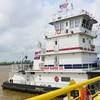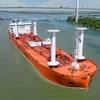Tanker Company Fined $1.5M
“The funds provided as a result of today's settlement help us realize the goal of restoring the breeding grounds of migratory shorebirds, like the piping plover,” said Tom Sansonetti, Assistant Attorney General for the Justice Department's Environment and Natural Resources Division. “Additionally, this settlement will help to restore the beaches that were affected by this spill.”
The U.S. Coast Guard first reported an oil spill on May 10, 1996, from the 846-foot Bahamian-flagged Anitra, which was anchored at the Big Stone Anchorage. The ship was in the process of unloading more than 40 million gallons of light crude oil. By May 19, the Coast Guard concluded that over 40,000 gallons of oil had been released from the vessel. The Coast Guard attributed the spill to an apparent misalignment of valves, causing a leak from the Anitra below the surface of the bay.
Although the Coast Guard reported that 12,000 gallons of oil were recovered from the vicinity of the vessel, the remainder of the oil floated to 50 miles of beaches over the two week period following the spill. The oil impacted several state wildlife management areas, two state parks, and the Edwin B. Forsythe National Wildlife Refuge. Cold and stormy weather during the spill caused the oil to form tarballs, which washed along eight miles of shoreline in Stone Harbor, Avalon, Sea Isle and Ocean City. At the time, the governor declared a limited state of emergency in Cape May County, limiting public access to beaches.
The beaches impacted by the spill function as breeding and forage areas for local and migratory shorebirds, including the piping plover. The piping plover is listed by New Jersey as endangered and by the United States as a threatened species. A number of birds were oiled as a result of the spill.
“This settlement compensates New Jersey residents for substantial damage to 50 miles of the state’s coastal beaches caused by the Anitra oil spill,” said Bradley M. Campbell, commissioner of the New Jersey Department of Environmental Protection. “These funds will improve the habitat for the abundant shorebird population along the coast for thousands of visitors to enjoy each year.”
The trustees include Interior’s Fish and Wildlife Service, Commerce’s National Oceanic and Atmospheric Administration, which served as the lead response agency, and the New Jersey Department of Environmental Protection. The trustees intend to use approximately $1.25 million of the settlement amount to fund restoration measures for the birds. For example, some of the funds will be utilized to establish a protective management program for piping plovers, including fencing and predator control. As for migratory shorebirds, the trustees presently intend to clear beach debris from Thomson Beach, New Jersey, to provide horseshoe crabs-an important source of food for the birds-egg-laying habitat. Approximately $250,000 of the $1.5 million payment will be used to reimburse investigative costs of the natural resource Trustees.
“This settlement allows for a focused, joint agency effort that will benefit migratory shorebirds, including federally threatened piping plovers, by improving and protecting vital coastal habitat. We are on track to put these funds into proactive projects,” said Marvin Moriarty, Regional Director of the Fish and Wildlife Service of the Department of the Interior, located in Hadley, Massachusetts.
The proposed consent decree outlining the settlement was lodged in court today. It is subject to a 30-day public comment period and final court approval.










